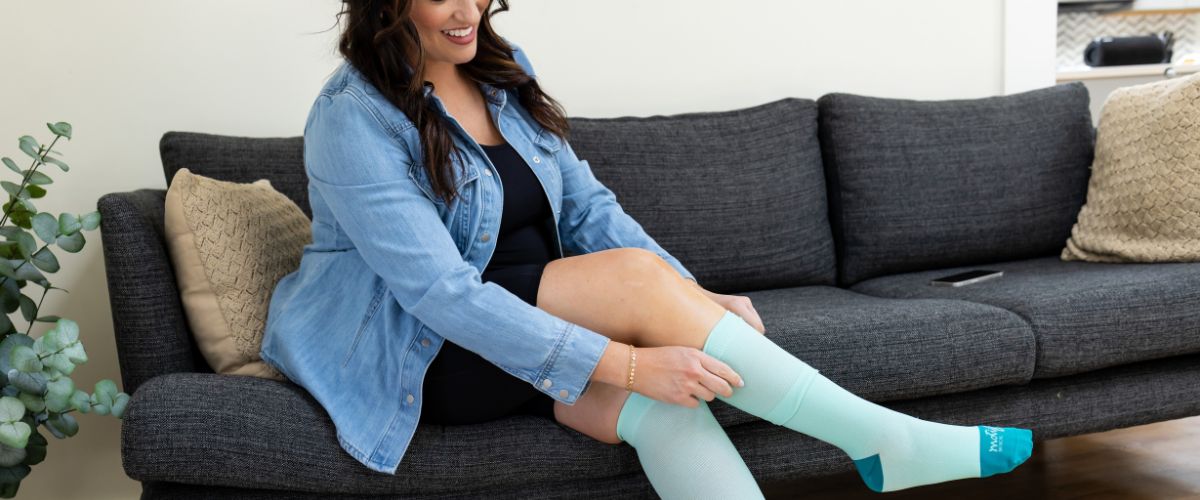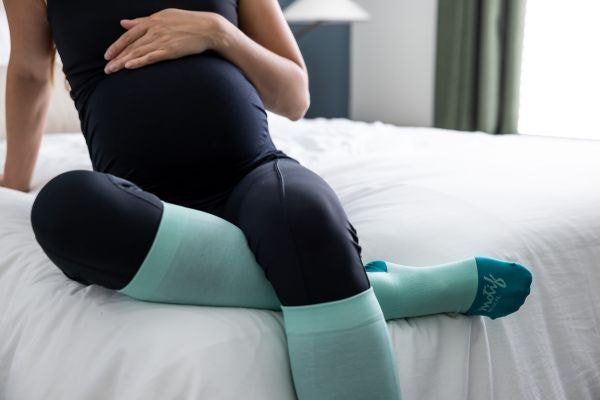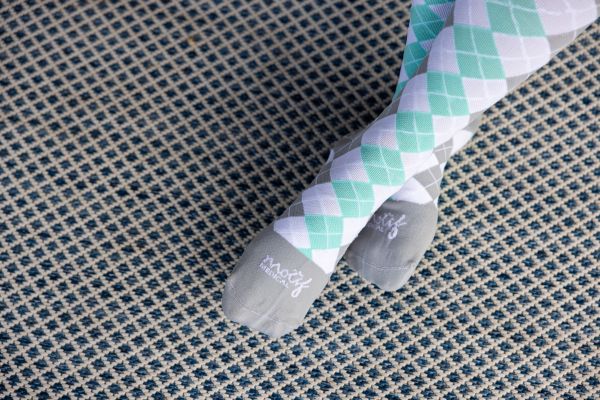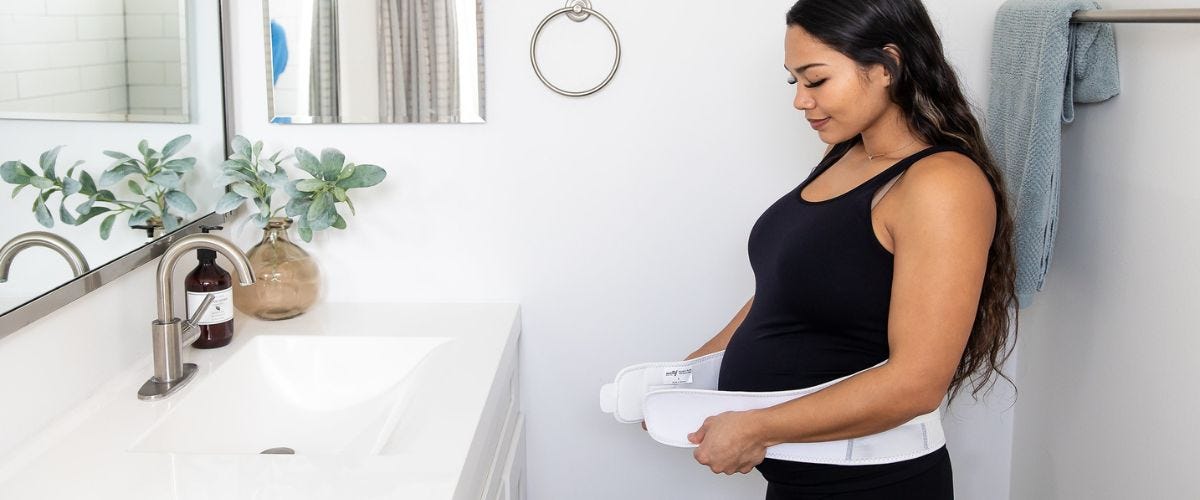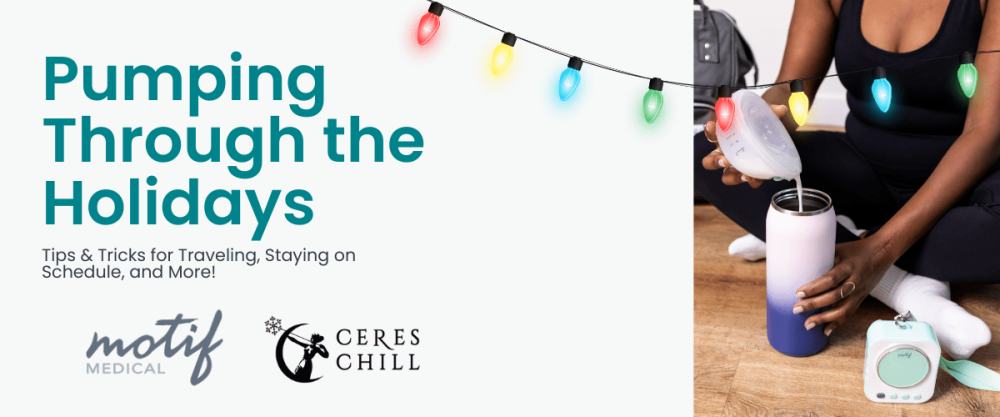A lot of changes happen in your body while you’re pregnant! Pregnancy swelling, or edema, is extra fluid that collects in your tissues. It is considered a normal part of a healthy pregnancy and is caused by the increased blood volume your body produces to provide the baby with all its nutritional needs.
When Does Swelling Start in Pregnancy
This increase in fluid and blood volume occurs between 20 and 28 weeks of pregnancy, which is also when people begin to notice swelling in their feet, ankles, legs, and hands. The growing baby and uterus also contribute to fluid retention in late pregnancy, as their weight compresses the blood vessels that supply the lower extremities. This makes it harder for the cardiovascular system to pump blood back up to the heart. Normal swelling of the feet, ankles, and hands is generally worse at the end of the day, in the third trimester, and should improve when you lie down or prop your feet up. Swelling is one of the most common symptoms related to pregnancy
How to Reduce Swelling in the Feet During Pregnancy
There are several nutritional and lifestyle adjustments that pregnant women can make to help reduce swelling in the feet and legs during pregnancy:
1. Prop Your Feet Up
Avoid standing for long periods. Feet swelling during pregnancy usually worsens throughout the day, so try to schedule regular times to elevate your feet above the level of your heart. When you get home at night, lie down on your left side, as this position helps improve blood flow and aids your body in reducing the excess fluid held in your legs, feet, and ankles.
2. Drink Plenty of Water
While it may seem counterintuitive, adequate water consumption is essential to help your body maintain fluid balance and manage pregnancy swelling.
Aim for 8 to 10 glasses of water a day. Your kidneys play a crucial role in regulating the fluid balance in your body. If your body thinks more fluids might be needed, your kidneys cause you to retain more fluids. This is what happens when it is hot outside or if you are dehydrated. When you drink enough water every day, your kidneys won't feel the need to hang on to extra, just in case.
3. Balance Your Electrolytes
Salt, potassium, calcium, and magnesium are all important electrolytes that your body needs to regulate the fluids in your body. You can get these essential minerals from the foods you eat or by adding electrolytes to the water that you are already drinking. A healthy diet is a great defense against uncomfortable pregnancy swelling.
4. Stay Active
Sitting or standing in one place for too long can cause increased swelling. Include periods of walking or other movement to help your blood flow and reduce fluid accumulation. Being active optimizes the function of your circulatory system, which helps prevent your body from retaining excess fluids in your tissues.
5. Wear Compression Socks
If you know you’re going to be unable to move around, such as when you’re traveling, or if you know you’re going to be on your feet for a long time, a pair of compression socks will be your best friend! The external support they provide to your calves, ankles, and feet helps prevent fluid accumulation in these areas. Compression socks promote good blood flow in the lower extremities, which can make your travels or busy days more enjoyable.
When Should Swelling During Pregnancy Be a Concern?
While swelling in pregnancy can be normal, some warning signs should prompt you to immediately contact your healthcare provider.
Preeclampsia
Preeclampsia is a serious health condition that can occur during pregnancy. It is characterized by sudden swelling, often accompanied by rapid weight gain. High blood pressure, headaches, visual disturbances, and kidney pain often accompany it.
If you are experiencing any of those symptoms, such as sudden and severe swelling in your feet, ankles, and legs, you should contact your obstetrician or midwife immediately, as it may be a sign of preeclampsia.
Deep Vein Thrombosis (DVT)
The cardiovascular system changes in pregnancy also predispose people to varicose veins and deep vein thrombosis, or DVT. DVT is a blood clot that forms in one of the deep veins of the body and is a life-threatening condition that must be taken very seriously.
Symptoms include a warm, red area on your body, often located on the calf or behind the knee. Some people also report swelling that only occurs on the affected side of the body. Do not rub the affected area, as this could dislodge the blood clot; instead, call your healthcare provider for their medical advice.
What About Post-Pregnancy Swelling?
It's very common to experience post-pregnancy swelling in your feet, ankles, and legs. After delivery, it takes time for your body to eliminate the extra fluid it retained for nine months. You may notice that your feet continue to swell after pregnancy or even seem to increase slightly in the first week postpartum. This post-pregnancy swelling is generally normal and should gradually subside as your body recovers. However, if the swelling is accompanied by pain, redness, or headaches, contact your doctor.
Find Relief and Comfort with Maternity Compression
Want to proactively manage pregnancy swelling and keep your legs and feet feeling great? Our maternity compression socks are designed to provide gentle, effective support to improve circulation and reduce discomfort. Don't wait for swelling to slow you down. Shop the Motif Medical Maternity Compression Collection
Information provided in blogs should not be used as a substitute for medical care or consultation.

